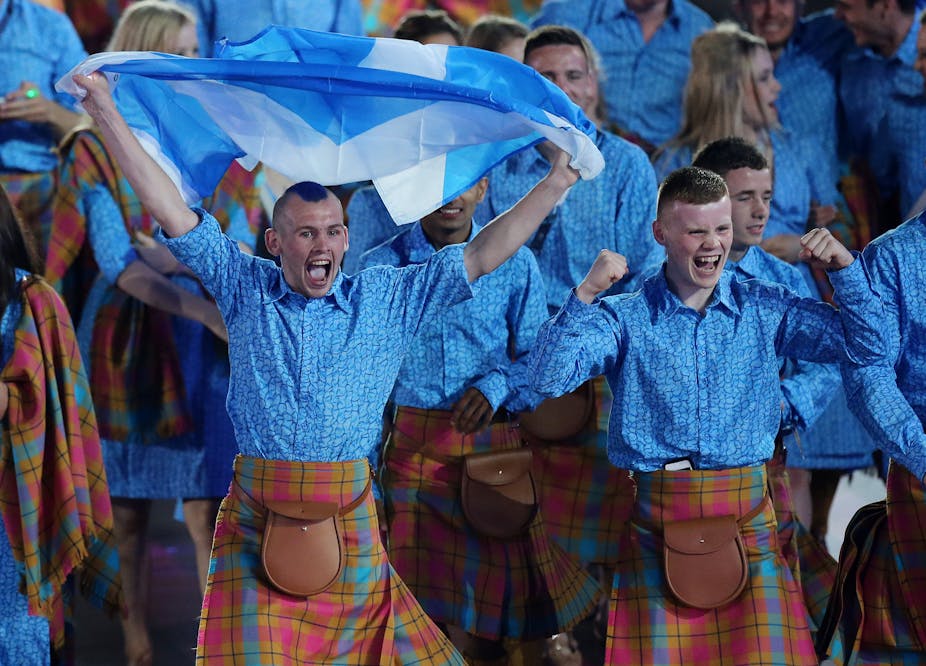Sport mega events such as the Commonwealth Games are routinely described as global spectacles, but they always focus intensively on one part of the globe for a short period.
For the hosts, this is the essence of their appeal and justification for all the expense, trouble and risk: the “whole world is watching”, the value of the publicity is priceless, and it is hoped that all that media interest can be translated into long-term tourism profile and return on investment.
Scotland is the latest country to take the mega event bait – in this case snagging a big sports party out of the remnants of an Empire that somehow reinvented itself as a Family.
Sport has played no small role in the symbolic survival of a time when red blotched much of the world map, overshadowing even Hollywood as a cultural force spreading out from the West.

How ironic, then, that Glasgow should convene the old Empire at play at just the moment that Scotland is considering a vote to dissolve the Union. Perhaps when the Games are next held on Australia’s Gold Coast in 2018, the host of 2014 will not qualify or wish to compete.
The Scottish National Party sees a successful Commonwealth Games as usefully presaging an ascendant independent Scotland. If London could do it in 2012 with the Olympics, then so could Glasgow, with the useful disaggregation of Olympic Team GB now allowing the Commonwealth’s Team Scotland to shine.
Scottish First Minister Alex Salmond urged support for “Scolympians” such as Andy Murray and Chris Hoy in 2012, but has artfully declared a “self-denying ordinance” of eschewing duels with anti-independence opponents for the duration of the Games – the Commonwealth equivalent of the Olympic Truce.
The city itself is also keen to avoid becoming embroiled in Scottish independence politics because it isn’t very good for the immediate business of holding a feel-good event at which many participants and spectators would probably mistake Holyrood for a postmodern castle rather than a working parliament.
But is it worth it?
Is Glasgow getting a global bang for its locally minted quid? A scan of Australian media in the lead up to the Games would suggest not.
For a long time coverage of the Games was sparse, let alone stories concerning the host city. Most stories have focused on individual Australian athletes and their pathways to selection, or on Australian teams and their aspirations regarding the Games. This is an unsurprising empirical observation for sport event watchers.
In the absence of a major political issue (such as the human rights protests leading up to the Beijing 2008 Olympics), the principal focus of national media is inevitably on the nation’s sporting prospects.
It is for this reason that for some time there were more Australian stories about the push for inclusion by rugby league or complaints about the Australian team uniform than about the appeals of Glaswegian life.
One story focused on Glasgow that did cut through was the (ultimately aborted) plan to incorporate the demolition of the Red Road high-rise public housing buildings within the Opening Ceremony in order to symbolise the urban regeneration of east Glasgow.

This bold but flawed pre-emptive move was designed to address Glasgow’s image problem – patently inaccurate for those who have been there – as an unremittingly tough, depressed and depressing town.
When designated as 1990’s European City of Culture, Glasgow was the butt of many jokes that could only work through an assumed incongruity.
Come 2014, Australian journalists such as Peter FitzSimons were re-circulating such internet jokes during the Brazil World Cup as
I just can’t get excited about a sporting event where a government has spent millions funding it, yet people still live in squalor and deprivation. Where drugs are rife and life expectation is very low. But enough of the Commonwealth Games in Glasgow …
Small wonder, therefore, that much of the media coverage of Glasgow as the setting for the Commonwealth Games has involved tourist promotion through sponsored travel stories in which the writer’s visit was facilitated by the likes of Visit Britain, British Airways and the Glasgow City Marketing Bureau.
Beyond travel journalism, Glasgow only really came into focus in Australia when its national team arrived there, along with the posse of journalists who could cover the sport and write “colour pieces” during the downtimes.
Interpreting the Opening Ceremony is always a reliable kickstarter – and in this case also interpreting the broad Glaswegian brogue of Games volunteers.
Will Glasgow’s “weird, wacky and spectacular opening ceremony” and the ensuing sport and street action mean that, in the words of the city’s Marketing Bureau “the Glasgow 2014 Commonwealth Games will be an unforgettable celebration of sport and culture, leaving a lasting legacy for athletes, young people, businesses and communities”?
That is every mega sport event’s aspiration – and for most it is as elusive as the craved attention from international media (like Australia’s) who remain resolutely fixated on their own nation’s athletes for the delectation of the folk back home.

